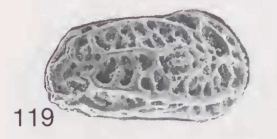WoRMS taxon details
Quasibradleya elongata Howe & Mckenzie, 1989
794403 (urn:lsid:marinespecies.org:taxname:794403)
accepted
Species
marine, fresh, terrestrial
recent + fossil
Howe, H. V.; McKenzie, K. G. (1989). Recent marine Ostracoda (Crustacea) from Darwin and north-Western Australia. Monograph Series of the Northern Territory. <em>Museum of Arts and Sciences No.</em> 3: 1-50. [details] Available for editors  [request]
[request]
Description "Carapace medium sized; elongate subrectangular; ornamented with stong longitunal and marginal ridges and intervening...
Etymology elongata (L.) elongate. (Howe; McKenzie,1989; 40)
Description "Carapace medium sized; elongate subrectangular; ornamented with stong longitunal and marginal ridges and intervening trabsverse costae which form large reticules giving overall coarsely reticulate appearance; the main ridge are an antero - to ventromarginal ridge, a curved dorsal ridge, and an irregular median ridge (genus character); valves denticulate anteriorly and to less extent posteriorly where there is a short caudal process, eye tubercle indistinct connected by riblets to the dorsal and median ridges; immediately below the eye tubercle is a large subcircular reticule; greatest height anteromedial and about half the lenght; greatest breadth postcromedial due to posteroventral expansion of the valves and over half the lenght. Inner lamellae moderately broad, without vestibules and with numerous flexous to straight marginal pore canals; normal pore canals include simple open and celated pores as well as sieve pores; hinge hemiamphidont; central muscle scars comprising four adductors in subventral series, plus two frontal scars and two mandibulars. Sex dimorphism as yet unconfirmed but likely to be distinct with ♀ relatively higher than ♂." (Howe; McKenzie,1989; 40) [details]
Etymology elongata (L.) elongate. (Howe; McKenzie,1989; 40)
Etymology elongata (L.) elongate. (Howe; McKenzie,1989; 40) [details]
Brandão, S.N.; Antonietto, L.S; Nery, D.G.; Pereira, J.S.; Praxedes, R.A.; Santos, S.G.; Karanovic, I. (2025). World Ostracoda Database. Quasibradleya elongata Howe & Mckenzie, 1989. Accessed through: World Register of Marine Species at: https://www.marinespecies.org/aphia.php?p=taxdetails&id=794403 on 2025-04-05
Date
action
by
![]() The webpage text is licensed under a Creative Commons
Attribution 4.0 License
The webpage text is licensed under a Creative Commons
Attribution 4.0 License
Nomenclature
From editor or global species database
Description "Carapace medium sized; elongate subrectangular; ornamented with stong longitunal and marginal ridges and intervening trabsverse costae which form large reticules giving overall coarsely reticulate appearance; the main ridge are an antero - to ventromarginal ridge, a curved dorsal ridge, and an irregular median ridge (genus character); valves denticulate anteriorly and to less extent posteriorly where there is a short caudal process, eye tubercle indistinct connected by riblets to the dorsal and median ridges; immediately below the eye tubercle is a large subcircular reticule; greatest height anteromedial and about half the lenght; greatest breadth postcromedial due to posteroventral expansion of the valves and over half the lenght. Inner lamellae moderately broad, without vestibules and with numerous flexous to straight marginal pore canals; normal pore canals include simple open and celated pores as well as sieve pores; hinge hemiamphidont; central muscle scars comprising four adductors in subventral series, plus two frontal scars and two mandibulars. Sex dimorphism as yet unconfirmed but likely to be distinct with ♀ relatively higher than ♂." (Howe; McKenzie,1989; 40) [details]Dimensions "Holotype - L, 0.68; H, 0.33; B, 0.36. (Howe; McKenzie,1989; 40) [details]
Etymology elongata (L.) elongate. (Howe; McKenzie,1989; 40) [details]

